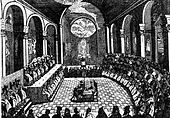
Back I Никеитәи Адунеизегьтәи Аизара ду Abkhazian Eerste Konsilie van Nicea Afrikaans Primer Concilio de Nicea AN مجمع نيقية الأول Arabic مجمع نيقيا الاول ARZ Conceyu de Nicea I AST Birinci Nikeya Kilsə Məclisi Azerbaijani Першы Нікейскі сабор Byelorussian Першы Нікейскі сабор BE-X-OLD Първи вселенски събор Bulgarian
This article may have too many section headers. (January 2024) |
| First Council of Nicaea | |
|---|---|
 The Council of Nicaea, with Arius depicted as defeated by the council, lying under the feet of Emperor Constantine. | |
| Date | May to August AD 325 |
| Accepted by | |
Next council | First Council of Constantinople |
| Convoked by | Emperor Constantine I |
| President | Hosius of Corduba |
| Attendance |
|
| Topics | Arianism, the nature of Christ, celebration of Passover, ordination of eunuchs, prohibition of kneeling on Sundays and from Easter to Pentecost, validity of baptism by heretics, lapsed Christians, sundry other matters.[1] |
Documents and statements | Original Nicene Creed,[2] 20 canons,[3] and a synodal epistle[1] |
| Chronological list of ecumenical councils | |
| Part of a series on the |
| Eastern Orthodox Church |
|---|
| Overview |
| Part of a series on |
| Oriental Orthodoxy |
|---|
 |
| Oriental Orthodox churches |
|
|
| Part of a series on the |
| Ecumenical councils of the Catholic Church |
|---|
 |
| 4th–5th centuries |
| 6th–9th centuries |
| 12th–14th centuries |
| 15th–16th centuries |
| 19th–20th centuries |
|
|
The First Council of Nicaea (/naɪˈsiːə/ ny-SEE-ə; Ancient Greek: Σύνοδος τῆς Νίκαιας, romanized: Sýnodos tês Níkaias) was a council of Christian bishops convened in the Bithynian city of Nicaea (now İznik, Turkey) by the Roman Emperor Constantine I. The Council of Nicaea met from May until the end of July 325.[4]
This ecumenical council was the first of many efforts to attain consensus in the church through an assembly representing all Christendom. Hosius of Corduba may have presided over its deliberations.[5][6] Its main accomplishments were settlement of the Christological issue of the divine nature of God the Son and his relationship to God the Father,[2] the construction of the first part of the Nicene Creed, mandating uniform observance of the date of Easter,[7] and promulgation of early canon law.[3][8]
- ^ a b SEC, pp. 112–114
- ^ a b SEC, p. 39
- ^ a b SEC, pp. 44–94
- ^ Hanson 1988, p. 152.
- ^ Carroll 1987, p. 11
- ^ Vallaud 1995, pp. 234–235, 678.
- ^ On the Keeping of Easter
- ^ Leclercq 1911b